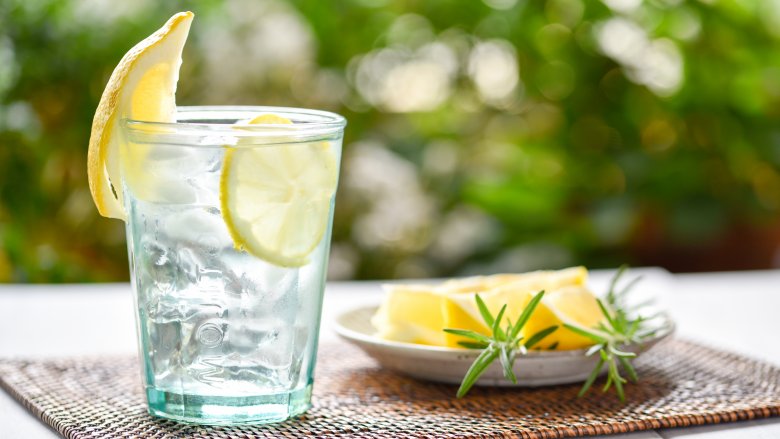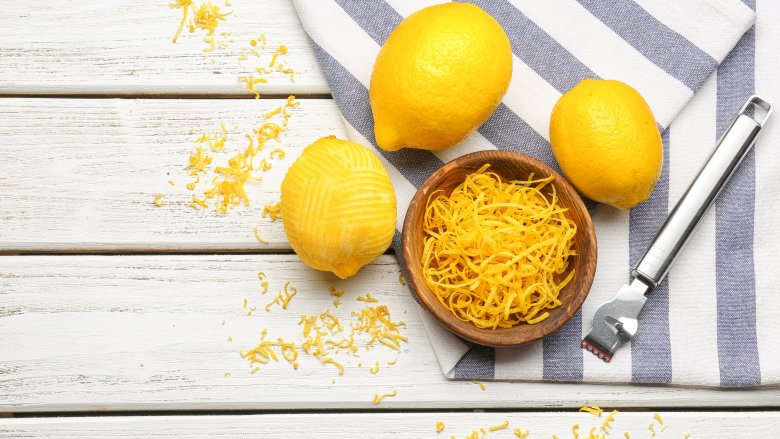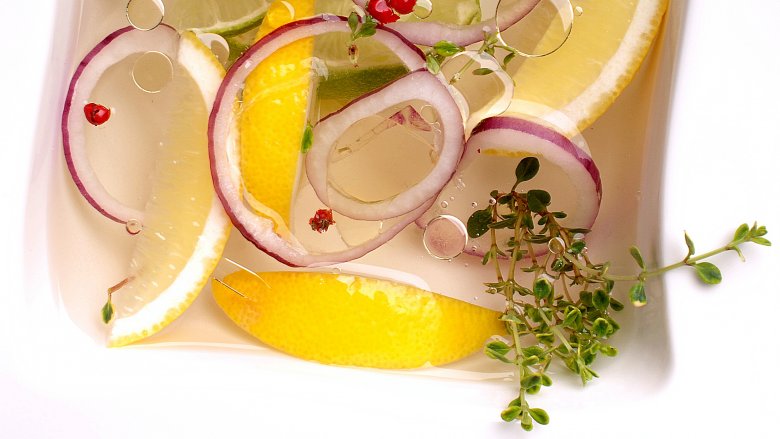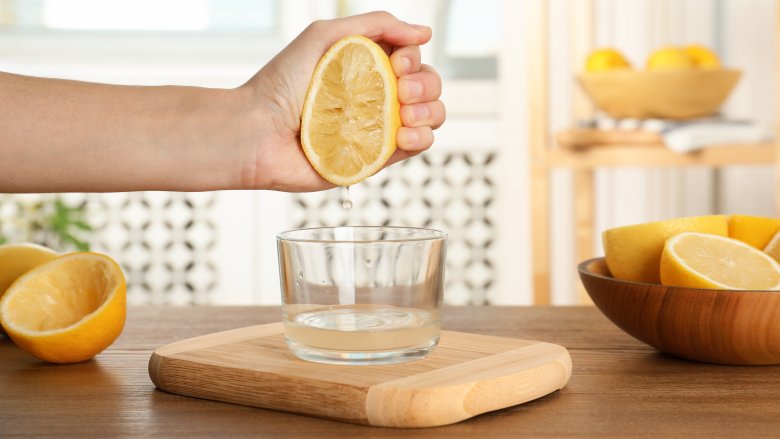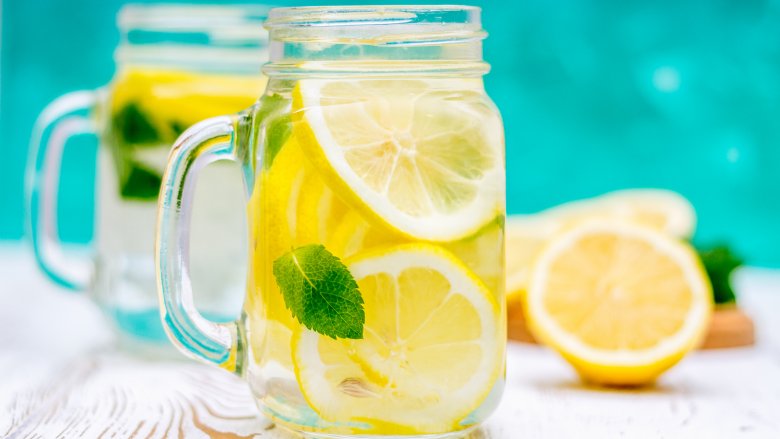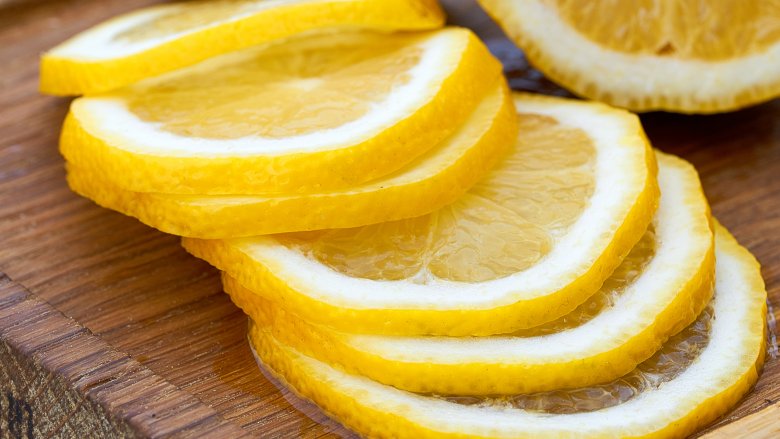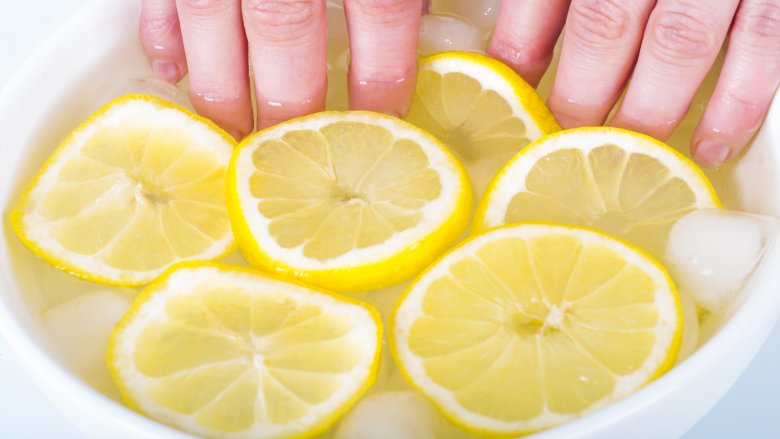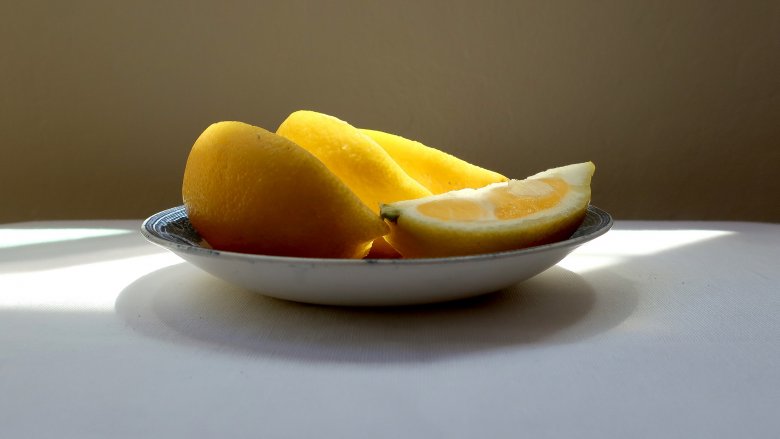The Untold Truth Of Lemons
There are few fruits that are as versatile as lemons. They work in sweet and savory dishes, in drinks, desserts, and especially over fish. And they've been around for a long, long time.
According to National Geographic, researchers have used the DNA of today's citrus fruits to trace them back to some time in the late Miocene epoch... but what the heck does that mean? That means wild citrus trees have been growing for around seven to eight million years.
The BBC says those original trees came from the foothills of the southern Himalayas, and it wasn't until the weather shifted and became drier that they began to spread. That was about four million years ago, and since that spread we've cultivated today's fruit. Lemons are descended from the citron, the sour orange, and the pomelo, and from the very moment mankind first bit into one, they were special. Lemons were especially prized by the ancient Romans and other Mediterranean peoples, who considered them a valuable commodity for their rarity, exoticism, and their usefulness, both practical and symbolic (via LiveScience).
And things haven't changed too much. We still value these deliciously sour fruits, and it turns out there's a lot of fascinating things you might not know about them.
You definitely shouldn't put lemon in your drink
If you opt for a glass of water with your dinner, there's a good chance a restaurant might drop a slice of lemon in your beverage to make it not quite as boring as regular old water. But a series of studies — including one published in the Journal of Environmental Health and one from Clemson University — found that a huge percentage of those lemons came with dangerous bacteria and microbes.
For just one little bit of food for thought, Clemson studies found that when someone with E. coli on their hands touched a wet lemon, the bacteria was transferred a shocking 100 percent of the time — even though lemons do often have antimicrobial properties. Are those odds you'd like to bet on?
They found that lemons were rarely cut with the same care shown to other kinds of food, and tended to pick up things like E. coli from hands, cutting boards, and utensils. It was even worse when they looked at the lemon that's sliced and served at a self-service drinks station instead of in the kitchen — not only are other people reaching their potentially grimy hands in there, but they're rarely kept at the right temperature. Plain water is fine, thanks.
Lemon could cure and combat a horrible disease
Scurvy is a very olde-timey sounding name for a disease that's caused by a vitamin C deficiency, and it's horrible. Without getting into too many gory details, Healthline says that vitamin C is essential for the production of collagen, which holds the body's tissues together. When a person doesn't get enough, scurvy sets in — and brings along horrible things like skin, eye, and mouth hemorrhages, internal bleeding, tooth decay, and other equally terrible things.
According to the BBC, men sailing the seven seas up through the 18th century were particularly susceptible to the disease, as they would often spend months on a ship with no real, fresh food to speak of. Entire crews of hundreds and hundreds were struck down by the rotting disease, and it wasn't until 1747 that James Lind discovered that lemons — and oranges — wouldn't just prevent scurvy, but cure it.
Later, the British Navy ordered hundreds and thousands of gallons of lemon juice for their ships, and scurvy was nearly eliminated. And National Geographic says it changed history, giving the British Navy the full complement of men they needed in order to stop Napoleon. Even today, the symbol of the Institute of Naval Medicine is a lemon tree.
The best ways to zest a lemon
There are a ton of recipes that call for lemon zest, so let's talk about why this isn't as much of a pain as it might seem.
First, your tools. If you have a tool that's meant specifically for zesting fruit, that's great — but not necessary. Real Simple notes that a box grater or a chef's knife both work just as well. Just grate the lemon like you would grate cheese, or peel off very fine slices with the knife — just like you'd cut the skin off an apple. Not sure you want to risk sacrificing your fingers? Grab a vegetable peeler and that'll work, too.
There's another important tip here, too — whichever method you use, it's important not to cut through the skin and into the white pith between the yellow skin and that delicious fruit. If you get any of the pith in your zest, it's going to be horribly bitter.
And if you're wondering whether or not it's worth using a whole lemon just for the zest, don't worry. What's Cooking, America says you can still keep it in the fridge for a while, just be sure to wrap it tightly in plastic wrap. That'll keep your lemon from drying out, and you'll be able to use the rest of it for another dish.
Here's what makes lemons sour
It takes a certain kind of palate to be able to bite into a lemon, but here's a little fun fact: according to National Geographic, the pH of the typical lemon is between two and three, and that means they're on the same part of the sourness scale as a dill pickle. Neat, right?
That pH value is what makes lemons taste sour, and without getting into science that's too complicated, here are the basics. According to the Australian Academy of Science: "Acidity is a measure of the concentration of hydrogen ions present when a substance is dissolved in a liquid." The more hydrogen it releases, the more acidic it is — and a lemon is surprisingly acidic.
The pH scale ranges from one to 14, with items rated at one being the most acidic. Pure water is a true neutral, with a value of seven. For some more perspective, vinegar is a three, cola is slightly more acidic at 2.5, and battery acid is a one.
But there's more to it than that. According to researchers from the University of Amsterdam (via Science), when things start getting too acidic, it starts interfering with cell function. Biology had to find something of a work-around, and that's the ability to push acidic substances into what's basically solitary confinement inside the cell. These pumps work overtime in lemons and other sour fruits, and weirdly, they're also pretty active in certain flowers and have been linked to the same function that gives, for example, petunias their red color. Weird? Absolutely.
You can definitely grow your own lemons
You don't have to live in a tropical area to grow your own lemon tree — how cool is that? According to The Royal Horticultural Society, citrus plants tend to do well in bright, sunny rooms, and while they can thrive outdoors in the hot summer months, they'll just need a little TLC in the winter.
So, what do you need to start your own? The Farmers' Almanac says that you can use some seeds from any lemon, clean off any fleshy fruit, then plant in a pot under about half an inch of moist soil. Cover the pot with plastic wrap (with a few holes poked in the top), put it in a place where it's going to get a lot of direct sunlight, and be sure to keep it moist. Then wait.
Seedlings take about two weeks to appear, and need to be repotted as they grow. And best of all? It only takes about three years before the tree will start producing lemons. It'll be anywhere from four to 12 months between blossoming and harvesting.
Lemon is more than a marinade
There's a weird belief floating around that lemons are so acidic that they can actually cook beef. That's just not true: SFGate says that if you try to eat beef "cooked" with lemon juice, there's a good chance you're going to get sick because it's not actually capable of raising the temperature of beef to a level deemed safe.
But when it comes to beef, lemon has some even stranger properties. If you add lemon to a marinade, you're not just changing the flavor of it, you're actually tenderizing it, too.
Fine Cooking says that marinating meats in a highly acidic solution — like a lemon-based one — will cause a reaction where protein bundles start to break down and the meat will become more tender. But there's a catch: if you marinate for too long in that same acidic solution, it will make the meat tougher. Your best bet for beef is to cut it into small cubes and give it just a short rest in the marinade. No overnight prep needed for this one!
No, you definitely shouldn't use lemon on your face... or squeeze it outside
There's a rumor that lemons and lemon juice is great for your skin, but this just isn't false, it's potentially dangerous.
In spite of all the people claiming that regularly treating their face with lemon juice cleared up their acne, dermatology experts at the True Skin Care Center say that it's not a good idea. While part of the claims are true — lemon does act as an exfoliant — lemons are so acidic that it can actually change the pH of your skin, and if you head out for some sun and fun after applying it, it can actually react with the sun to cause chemical burns.
And even if you're not using it for skincare, you should still be aware of the reaction. If you're out in your backyard making lemonade or lemony cocktails, or having lunch on the porch and squeezing some fresh lemon onto your fish tacos, there's a possibility the same reaction will happen. It's officially called phytophotodermatitis, and dermatologist Dr. Mona A Gohara says (via Good Housekeeping) that the discolorations from the burns can last for months.
Since lemons have different levels of acidity, there's no telling how bad a reaction might be. And it can be bad — there's at least one case of it causing second degree burns.
Here's why you should add lemon to your diet... in moderation
First, the good news: lemons are good for you. According to Healthline, there are a ton of great reasons to add them to your diet. They're a great source of vitamin C that has been shown to reduce your risk of stroke and heart disease), and regularly eating citrus fiber has been found to lower cholesterol levels. Citric acid has been linked to lessening the frequency of kidney stones in some studies, and lemons also help prevent iron deficiency. They don't contain much iron themselves, but they do make your body more efficient at absorbing what you get from other foods. They've also been linked to helping prevent certain types of cancers, and aiding in weight loss, but more studies are needed there for some conclusive evidence.
Now, the bad news. Too many lemons can have some negative effects, says Insider. That includes the erosion of the enamel of your teeth, making canker sores worse, and it might upset your digestive tract. Citrus fruits and lemons are a known migraine trigger for many people, as well, so it pays to be aware of how you're feeling after adding a squeeze of lemon juice to your water or a slice to your drink.
Here are other ways you can use lemons in the kitchen (that don't involve cooking)
So, you've picked up a bag of lemons but you're pretty sure you're not going to eat them all before they go bad. Don't worry, there are plenty of other ways you can use them in the kitchen.
According to Self, they're brilliant when it comes to tough cleaning. Microwave looking a little funky? Slice some lemons, throw them in a bowl of water, and microwave for five minutes to loosen up any gunk that's been building up. You can also use them to get rid of the funk in your garbage disposal. Just take a cup of baking soda, half a cup of salt, a tablespoon of lemon zest, and lemon juice. Mix, add enough lemon juice so that the mixture holds its shape then you press it into an ice cube mold, and freeze. Drop into your disposal and run — with water — to freshen.
You can also use them to freshen your whole house in a brilliant hack that's great when you're having company. Slice your lemons, put them in a frying pan with some sprigs of rosemary, and add a few drops of vanilla and cover with water. Simmer, and voila: lemon and rosemary potpourri. Another brilliant way of getting that fresh smell is to dry your lemon peels and use them along with firestarter in your fireplace.
The reason you need a lemon on your nightstand
You've probably seen someone posting on Facebook that you should put a slice of lemon on your nightstand. It seems really unlikely that it's going to actually do anything, but this modern trend has roots in aromatherapy practices.
According to The Times of India, there's a whole slew of benefits that come with breathing in the pleasant smell of a fresh lemon every night. The strong scent is believed to help clear the nasal passages, and it's thought to be particularly helpful to those with asthma or other respiratory issues. It's also been credited with helping to control headaches, decrease stress and anxiety levels, and increase the amount of serotonin in the brain (that's the happiness chemical that is crucial to a balanced mood). It's even been suggested that it can help regulate blood pressure.
Doubtful? There are other benefits that even the most cynical non-believer will admit might just make it worthwhile to stock up on lemons. Not only does the strong smell of a cut lemon act as a natural air freshener, but it'll also help keep mosquitoes and ants away. Remember that for your next camping trip!
The reason there's always a lemon with your napkins
Depending on your point of view, going out to a fancy restaurant can either be a treat or a challenge. Sure, sometimes it's nice to get all dressed up, but sometimes... it's just a lot of effort for what always seems like just a little bit of food on the plate. You know those restaurants, the ones with tiny forks and the inevitable plate with a hot napkin and a few slices of lemon.
What's going on there? While it's tempting to think that you might be getting a quick palate cleanser along with your towels, this Redditor says something different:
"They are to be used as soap after finger courses. Lemon juice is quite effective at killing bacteria and removing odors and it is safe to eat which makes a lemon wedge the ultimate wet wipe for cleaning your fingers between courses."
Medical News Today says it's the high acidity of lemons that makes them excellent at killing bacteria, and it's the same reason you might get a finger bowl with a slice of lemon in it.
You can use lemon to write secret messages
If you never wrote secret messages when you were a kid, you were seriously missing out. And here's a fun fact you can pass on to your own kids: lemon makes a brilliant invisible ink.
According to National Geographic, all you need to do is use the lemon juice as ink to write on the paper. Let it dry. Then, the recipient just need to hold it (carefully) over a heat source to reveal the message. It works because the acid nature of the lemon juice weakens the fibers that make up the paper, so when they're exposed to the stressor of heat, they change color first.
If you care to try it, you'll be doing a fun little experiment that has been very serious at times. Renaissance artists were fond of using lemon juice when they needed to write something they wanted to keep secret, and wartime spies have used it for a long, long time. Lemon juice correspondence was used in wars from the American Revolution all the way up to World War II. During World War I, the British captured an entire group of spies — known as the "lemon juice spies" — who were using the technique to get information back to Germany, and the British National Archives even still has one of the lemons seized from one of the German spies. Who would have thought the lowly lemon would have been so important to the war effort?
Why are there lemons on the Missing Man Table?
Lemons also play a part in one of the most moving ceremonial gestures of the American military: the Missing Man Table.
It's also called The Fallen Comrade Table, says The Washington Times, and it's often seen set up in military dining halls and events, particularly around Memorial Day. The table is set for with six empty place settings, with a chair for the missing members of each branch of the service and one for civilians. Each element of the table represents something — the tables are round because of endless concern, the red rose is for the family members who still wait to find out what happened to their loved ones, the lit candle is for hope, and the glass is inverted as a reminder of their inability to participate in a toast.
And that brings us to the strangest thing on the table: a slice of lemon at every setting. The National League of POW/MIA Families says that "reminds us of their bitter fate, captured or missing in a foreign land." And that is incredibly powerful.

